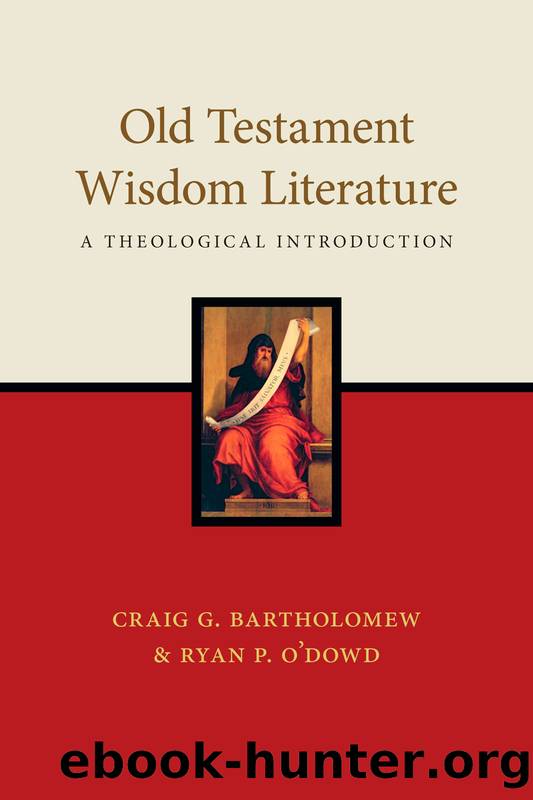Old Testament Wisdom Literature by Bartholomew Craig G.;O'Dowd Ryan P.;

Author:Bartholomew, Craig G.;O'Dowd, Ryan P.;
Language: eng
Format: epub
Publisher: InterVarsity Press
Published: 2016-08-15T00:00:00+00:00
ECCLESIASTES 1:12â12:7: QOHELETâS JOURNEY
Ecclesiastes is a carefully crafted whole, but as befits Qoheletâs excruciating search for meaning the book tracks back and forth as Qohelet explores area after area of life. The tension between his analysis of life through the grid of his autonomous epistemology, which leads him again and again to the conclusion that life is âenigmatic,â and the positive affirmation of life he knows from his upbringing as a believing Israelite exemplified in the carpe diem passages (e.g., Eccles 2:24-26), combined with the growing sense of irony drive the book forward to its denouement in Ecclesiastes 11:6â12:14.
A favorite phrase of Qoheletâs is life âunder the sun,â by which he refers to all of life as God has made it. And in his quest for solving lifeâs riddle, Qohelet ranges across a dizzying variety of areas of life. In Ecclesiastes 2:1-11 he explores pleasure and the good life, including wine, architecture, horticulture, music and sex. But none yield the answer he seeks.
In Ecclesiastes 2:12-23 he explores the problem of death and oneâs legacy. The enigma of death and the shadow it casts over the question of life surfaces repeatedly in Ecclesiastes (see Eccles 9:1-12). In Ecclesiastes 3:1-15 by means of a poem he investigates the problem of time; God has created us such that we need an overarching story of life, but where is it to be found? In Ecclesiastes 3:16-22 Qohelet focuses on injustice; in the law courts where one would expect to find justice he finds injustice! In Ecclesiastes 4 he examines the agonizing problem of oppression (see also Eccles 5:8-17), the problem of rivalry in work, the problem of individual isolation and lack of supportive community, as well as the problem of bad government (see Eccles 8:1-9).
The location of meaning in wealth and its pursuit is a major theme in Ecclesiastes;20 it is connected with oppression in Ecclesiastes 5:8-17, where the vulnerability of wealth is explored, as well as in Ecclesiastes 6:1-9; and Ecclesiastes 10:1-20 culminates in the ironic statement that âmoney meets every needâ (Eccles 10:19). Ecclesiastes 11:1-6 is about doing everything one can to secure oneâs wealth, but as Qohelet concludes in Ecclesiastes 11:6, this can never be guaranteed.
Each succeeding area that Qohelet explores with his epistemology of experience, observation and reason gets him nowhere; again and again he concludes that all is âenigmatic.â In Ecclesiastes 7:13-22 the stress this results in surfaces strongly. If God has made life crooked (Eccles 7:13) and if the character-consequence theology of Proverbs simply doesnât work (Eccles 7:15), then perhaps the answer is to be moderately wise and righteous and moderately wicked (Eccles 7:16-17)! This leads in Ecclesiastes 7:23-29 into a reflective section in which Qohelet looks back on his journey.
Download
This site does not store any files on its server. We only index and link to content provided by other sites. Please contact the content providers to delete copyright contents if any and email us, we'll remove relevant links or contents immediately.
The Five People You Meet in Heaven by Mitch Albom(3550)
The Secret Power of Speaking God's Word by Joyce Meyer(3169)
Real Sex by Lauren F. Winner(3013)
Name Book, The: Over 10,000 Names--Their Meanings, Origins, and Spiritual Significance by Astoria Dorothy(2978)
The Holy Spirit by Billy Graham(2943)
0041152001443424520 .pdf by Unknown(2843)
How The Mind Works by Steven Pinker(2811)
ESV Study Bible by Crossway(2773)
Ancient Worlds by Michael Scott(2680)
Churchill by Paul Johnson(2577)
The Meaning of the Library by unknow(2564)
The ESV Study Bible by Crossway Bibles(2548)
The Gnostic Gospels by Pagels Elaine(2527)
MOSES THE EGYPTIAN by Jan Assmann(2411)
Jesus by Paul Johnson(2351)
City of Stairs by Robert Jackson Bennett(2342)
The Complete Dead Sea Scrolls in English (7th Edition) (Penguin Classics) by Geza Vermes(2270)
The Nativity by Geza Vermes(2226)
Ancient Near Eastern Thought and the Old Testament by John H. Walton(2221)
